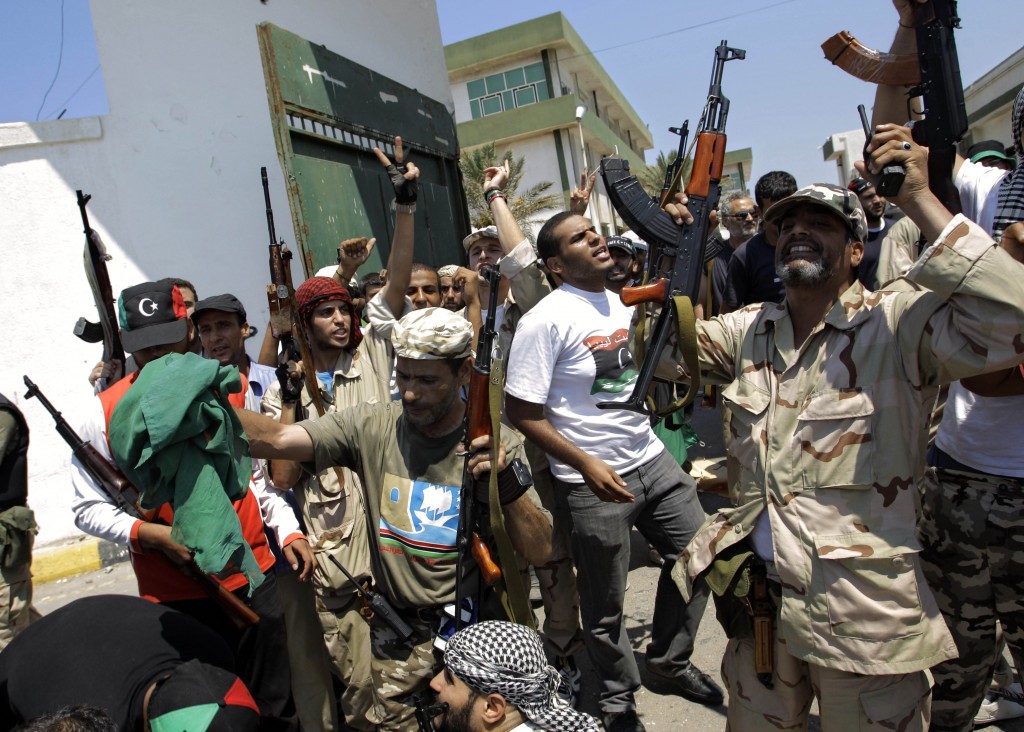Don't Expect Democracy in Libya

From the widespread reaction, you’d think the collapse of Muammar Qaddafi's regime in Libya was a World War II-type victory.
In fact it took six months of U.S., Canadian, British, French and NATO air strikes–most of the target practice with no return fire–before the “rebels” broke through to Tripoli.
That is, around 8,000 air strikes–mostly shooting fish in a barrel.
And now we learn that Special Ops troops from Britain and France, plus the CIA, have been undercover in Libya working against Qaddafi. As far as Britain is concerned, “Special Ops” troops likely mean the SAS, arguably the best soldiers in the world for that sort of clandestine fighting.
So here we have the world’s most modern strike aircraft pounding Qaddafi forces on a daily basis ... with the backing of the democracies, NATO, and the Arab League (but with no regular army or “boots on the ground”) ... it takes six months to rout Qaddafi.
Some victory, as Churchill might have said.
It could be argued that a brigade of British (or Western) soldiers could have cleaned up Libya within weeks instead of months, considering the country was in the turmoil of rebellion. But we (rightly) left it to Libyans to get rid of their dictator – with significant, albeit it hypocritical, help.
But is Libya a “victory”?
We don’t know much about the rebel leadership and the National Transitional Council (NTC) that Canada, for one, is pledged to support. What we do know is that the rebels have gotten rid of one of their military leaders – former Interior Minister Abdul Younis — who was assassinated by his own fighters in Benghazi for reason unknown.
That’s an uncomfortable omen for the future.
Also known is that with total victory, tribal and ideological factionalisms surface, and scores beg to be settled.
Many Libyan factions that were united in their opposition to Qaddafi, don’t much like one another and have differing agendas.
Hopes for Libya evolving into the sort of democracy seem misguided and unlikely. News videos of the rebel army entering Tripoli and celebrating by firing weapons non-stop into the air, are not reassuring for those who seek stability, responsibility, restraint.
The term “Arab spring” is widely applied to the rebellions that have surged through the Middle East this year, as if it is the birth of Arab democracy. In fact none of the “rebels” in countries involved has ever experienced democracy: Tunisia, Morocco, Egypt, Libya, Yemen, Bahrain, etc. So the “Arab Spring” may not be what we assume it is.
Another disquieting reality of the “victory” in Libya, is how many leading members of Qaddafi’s regime have suddenly switched sides and now look to support the incoming rebel regime, without knowing what it stands for.
Among these are the Second-in-Command of Libya’s Intelligence Service, Gen. Khalifah Mohammed Ali, and Foreign Minister Abdelati Obeidi. Are these the sort of guys one wants to lead the “new” Libya?
Next on the “Arab Spring” chopping block is Syria’s Bashar al-Assad, a more sinister, shrewdly sophisticated and homicidal leader than Qaddafi. Assad has slaughtered more of his own people than Qaddafi has of his.
Since Assad doesn’t rant, nor wears the costumes and funny hats preferred by Qaddafi, he’s taken more seriously. Until he’s toppled, the International Criminal Court (ICC) is unlikely to issue a warrant for his arrest for crimes against humanity.

